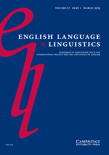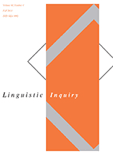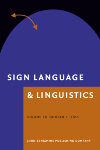
LINGUISTIQUE
Scope & Guideline
Cultivating Insights in the World of Language
Introduction
Aims and Scopes
- Syntax and Structure:
The journal features extensive research on syntactic structures across different languages, focusing on aspects such as subordinate clauses, constructions, and grammaticalization processes. - Sociolinguistics and Language Policy:
Research often encompasses the interaction between language and society, including language policies, linguistic minorities, and the impact of social factors on language use. - Cross-Linguistic Studies:
A significant focus is placed on comparative studies of languages, exploring similarities and differences in grammatical structures, vocabulary, and usage. - Discourse Analysis:
The journal publishes studies that analyze language in context, including the examination of dialogism, discourse markers, and multimodality in communication. - Historical and Cultural Linguistics:
Research that investigates the evolution of languages, etymology, and the relationship between language and culture is also a core area of interest.
Trending and Emerging
- Language and Technology:
Recent studies have increasingly explored the intersection of language and technology, including the impact of social media on language use and the role of digital communication in shaping linguistic practices. - Modal and Aspectual Studies:
There is a growing interest in examining modality and aspect across various languages, particularly in relation to how these concepts are expressed and understood in different cultural contexts. - Emoticons and Digital Communication:
Research focusing on the linguistic characteristics of digital communication, such as the use of emoticons in Chinese and other languages, reflects an emerging interest in how language evolves in digital spaces. - Language and Identity:
Emerging themes surrounding the relationship between language and identity, including studies on gendered language and minority languages, are becoming more prominent, emphasizing the social dimensions of language. - Interdisciplinary Approaches:
There is a noticeable trend towards interdisciplinary research that integrates insights from anthropology, sociology, and semiotics into linguistic studies, broadening the scope of linguistic inquiry.
Declining or Waning
- Historical Linguistics:
There has been a noticeable decrease in the number of papers focusing solely on historical linguistics and etymology, suggesting a shift toward more contemporary linguistic issues. - Lexicography:
While lexicographical studies were once a prominent theme, recent publications indicate a waning interest, with fewer papers addressing dictionary practices and lexical analysis. - Traditional Grammar Studies:
Research centered on traditional grammar frameworks appears to be less frequent, possibly indicating a shift towards more innovative and interdisciplinary approaches to linguistic analysis.
Similar Journals

English Language & Linguistics
Cultivating Excellence in Language ScholarshipEnglish Language & Linguistics is a prestigious journal published by Cambridge University Press, specializing in the dynamic fields of linguistics and language studies. With an impressive Q1 ranking in both Linguistics and Language categories for 2023 and a notable placement in the Scopus metrics, where it ranks #142 out of 1088 in Arts and Humanities, the journal is recognized for its high-quality research contributions and robust impact in the scholarly community. Since its inception in 1997, English Language & Linguistics has provided a forum for researchers to explore various aspects of language, facilitating the dissemination of innovative ideas and empirical studies. With no open access options currently available, the journal remains a valuable resource within the United Kingdom and beyond, fostering a deeper understanding of language intricacies and their broader societal implications. For practitioners and academicians alike, this journal is a critical resource for keeping abreast of the latest advancements in linguistics.

Voprosy Yazykoznaniya
Fostering Scholarly Dialogue in Language StudiesVoprosy Yazykoznaniya, published by the esteemed Russian Academy of Sciences and the State Academy of Humanities (GAUGN), stands as a leading journal in the field of linguistics and language studies. With an impressive Q2 rank in Linguistics and Language for 2023 and a strong position within Scopus rankings, this journal fosters scholarly dialogue and pushes the boundaries of linguistic research by providing a platform for innovative studies, reviews, and analyses. Although not open access, its publication ensures high academic standards and visibility within the global academic community. Researchers, professionals, and students alike can benefit from the rich insights and diverse perspectives presented in this journal, serving as a vital resource for anyone interested in the intricacies of language and its role in society. Operating since 2009 and continuing to 2024, Voprosy Yazykoznaniya is an essential reference point for contemporary linguistic scholarship in the Russian Federation and beyond.

LINGUISTIC INQUIRY
Unraveling the Complexities of Language ScienceLINGUISTIC INQUIRY is a premier journal published by MIT PRESS, representing a critical platform for the advancement of research in the fields of linguistics and language studies. With an impressive Q1 category ranking in both linguistics and language disciplines for 2023, and ranking #149 in Arts and Humanities and #174 in Social Sciences according to Scopus metrics, this journal stands at the forefront of academic conversations around language theory, analysis, and application. LINGUISTIC INQUIRY caters to a diverse audience of researchers, professionals, and students, providing a robust forum for original research articles and theoretical discussions that push the boundaries of our understanding of language. While the journal currently does not offer open access, it remains an essential resource for those engaged in cutting-edge linguistic research. The journal's continuous publication since 1996 demonstrates its long-standing commitment to linguistic scholarship and innovation.

Language and Linguistics Compass
Charting New Territories in Language and LinguisticsLanguage and Linguistics Compass, published by Wiley, stands as a premier journal in the field of linguistics, showcasing innovative and interdisciplinary research. With its ISSN 1749-818X and E-ISSN matching, the journal has built a robust reputation, achieving an impressive Q1 ranking within the linguistics category for 2023, placing it in the top 4% of its field. Its Scopus rank of 48 out of 1167 highlights its influence and significance among linguistics journals, boasting a commendable 95th percentile. This journal serves as a vital resource for researchers, professionals, and students, offering a wide range of accessible articles that illuminate current trends and advances within the domain of language studies. Although it is not Open Access, the journal is committed to quality and diversity in its publications, ensuring scholarly articles from various sub-disciplines of linguistics are represented from 2008 through 2024. Located in the United Kingdom, Language and Linguistics Compass invites contributions from around the globe, reinforcing its status as a leading forum for linguistic discourse.

Turkic Languages
Exploring the Rich Tapestry of Turkic LinguisticsTurkic Languages is an esteemed academic journal published by HARRASSOWITZ VERLAG, dedicated to the exploration and analysis of Turkic languages within the broader fields of linguistics and language studies. With an ISSN of 1431-4983, this journal serves as a vital platform for researchers, professionals, and students interested in the intricate structures, dynamics, and cultural contexts of Turkic languages. Although it currently operates without an Open Access option, the journal's commitment to quality research is evident in its placement within the Q4 category of Linguistics and Language for 2023, alongside its Scopus rankings where it stands in the 30th and 26th percentiles for Language and Linguistics across Arts and Humanities and Social Sciences, respectively. The journal's scope encompasses a variety of linguistic phenomena, striving to foster a deeper understanding of Turkic languages and their significance in the global linguistic landscape. With converged years from 2017 to 2022, Turkic Languages continues to uphold its reputation as a crucial resource for advancing scholarship in this specialized field.

Journal of Portuguese Linguistics
Illuminating the Nuances of Portuguese LinguisticsThe Journal of Portuguese Linguistics is an esteemed peer-reviewed academic journal published by UBIQUITY PRESS LTD, dedicated to the exploration of the rich complexities of the Portuguese language and its various linguistic dimensions. With an ISSN of 1645-4537 and an E-ISSN of 2397-5563, this open-access journal has been disseminating valuable research since 2002, ensuring that knowledge is accessible to all scholars, professionals, and students interested in Linguistics. Based in Portugal, it features a distinct focus on the linguistics pertinent to the Portuguese language, facilitating discussions that span theoretical and applied interests. The journal holds a respectable Q3 quartile rank in the field of Linguistics and Language, reflecting its growing significance and contribution to academia, as evidenced by Scopus rankings that place it in the 71st and 68th percentiles in Arts and Humanities as well as Social Sciences. Researchers and practitioners alike will find Journal of Portuguese Linguistics to be an indispensable resource for fostering discourse and innovation in the study of language.

Taiwan Journal of Linguistics
Pioneering Research for a Deeper Understanding of LinguisticsTaiwan Journal of Linguistics, published by CRANE PUBL CO, is a prominent Open Access journal dedicated to the field of linguistics since its inception in 2003. With its ISSN 1729-4649 and E-ISSN 1994-2559, this journal serves as a vital platform for the dissemination of significant research and scholarly discussions from Taiwan and beyond. The journal particularly focuses on advancing knowledge in linguistic theory, language acquisition, phonetics, and sociolinguistics, catering to a diverse academic audience including researchers, professionals, and students. Although it currently holds a Q4 ranking in the Linguistics and Language category, the journal's commitment to quality and accessibility positions it as an emerging resource for those engaged in language studies. Currently ranked #584 in Arts and Humanities and #668 in Social Sciences, it provides critical insights and fosters scholarly exchanges that enhance understanding within the field. The journal's open access model ensures the broadest reach for its published articles, facilitating the global sharing of linguistic research. For more information, visit the journal’s website to explore its latest publications and submission guidelines.

Sign Language & Linguistics
Exploring the Intersection of Communication and CultureSign Language & Linguistics is an esteemed academic journal published by John Benjamins Publishing Co, dedicated to advancing the field of sign language studies and linguistics. With an ISSN of 1387-9316 and an E-ISSN of 1569-996X, this journal has earned a prominent place in the linguistic community, achieving a Q1 ranking in both the Linguistics and Language category, and standing out within the Scopus rankings, placing in the 77th percentile among the Arts and Humanities and 75th percentile in the Social Sciences categories. Sign Language & Linguistics spans over two decades of research, offering comprehensive insights and analyses from 1998 to 2024, promoting high-quality scholarly communication. Aimed at researchers, professionals, and students alike, this journal is essential for those exploring the intersection of sign languages, linguistics, and cultural studies, facilitating progressive discourse and fostering an understanding of this vital mode of human communication.

Verba-Anuario Galego de Filoloxia
Nurturing Language Studies for Tomorrow's ScholarsVerba-Anuario Galego de Filoloxia is a prominent academic journal published by UNIV SANTIAGO COMPOSTELA, dedicated to advancing the field of linguistics and language studies. Hailing from Spain, this journal provides a vital platform for researchers, educators, and students interested in Galician philology and its broader linguistic implications. Although it operates under traditional access models, the journal’s commitment to quality research is reflected in its categorization within Q3 in Linguistics and Language for 2023, showcasing its significant contributions to the field. Encompassing a convergence period from 2017 to 2024, Verba garners attention in both the Arts and Humanities and Social Sciences domains, with its Scopus rankings highlighting its moderate impact within these categories. By nurturing scholarly dialogue and disseminating innovative studies, Verba-Anuario Galego de Filoloxia plays a crucial role in promoting linguistic research, making it an essential resource for professionals and academic institutions striving to explore the complexities of language and philology.

Lingue e Linguaggio
Fostering Insights in Linguistics and Language StudiesLingue e Linguaggio, published by SOC ED IL MULINO, is a distinguished academic journal in the field of Linguistics and Language, hailing from Bologna, Italy. With an esteemed Q2 ranking in its category as of 2023, this journal is recognized for its contributions to both the arts and humanities as well as social sciences, achieving notable positions within Scopus rankings. It serves as a vital platform for researchers, practitioners, and students interested in exploring various linguistic phenomena, language dynamics, and theoretical frameworks. Although it operates under a traditional subscription model rather than open access, its comprehensive array of studies and publications provides significant insights and fosters academic discourse. With a publication period extending from 2002 to 2024, Lingue e Linguaggio continues to be a key resource for advancing the understanding of language in contemporary contexts.